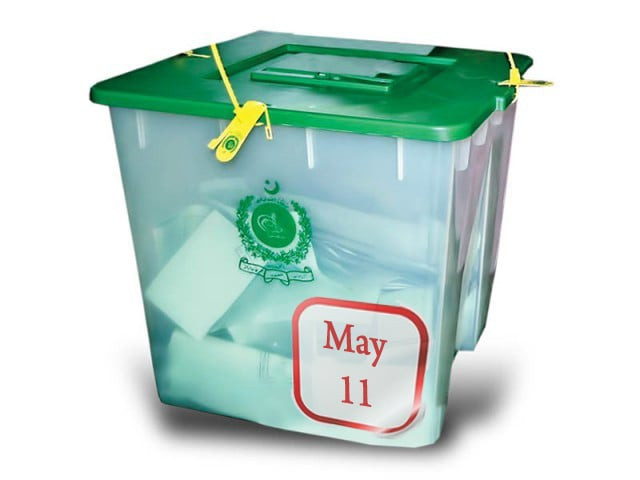Election security: Provinces to decide on deployment of army
Due to army’s deployment at borders, local authorities asked to finalise a security plan at polling stations.

ECP had earlier vowed that it would requisition the services of the army at sensitive polling stations across the country. PHOTO: EXPRESS/FILE
The Election Commission’s plan to depute the army at polling stations is unlikely to materialise as the matter has been left to the provincial administrations and local commanders are to decide if and where to deploy the armed forces on polling day.
At a meeting at the Election Commission of Pakistan (ECP) headquarters on Thursday, civil and military institutions discussed and shared their proposed security plans for the May 11 general elections but stopped short of finalising a consolidated plan, with the issue of army deployment at polling stations remaining open-ended.
ECP had earlier vowed that it would requisition the services of the army at sensitive polling stations across the country. The chief election commissioner had also announced that the army would be deployed in Karachi, where incidents of violence continue unabated.
But sources said Secretary Defence Asif Yaseen Mailk told the meeting that the army was already overstretched due to heavy deployments on the Afghan border and also in militancy-hit areas up north due to the on going campaign against extremists.
Moreover, a sizeable chunk of the army is deputed on the eastern border with India leaving only a limited force that could be spared for election duties, he was quoted as telling the meeting.
The defence ministry also backed the interior ministry’s advice that police, rangers and other para-military forces be deployed at the polling stations and that the army should be kept for contingency requirements as a ‘quick response force’.
After hectic deliberations it was decided that the provincial administrations will discuss with corps commanders if and where to deploy army.
Pak-Afghan border to be sealed
Sources privy to the meeting said representatives of the interior ministry said that the government was planning to seal the Pak-Afghan border in order to restrict any cross border infiltration on polling day.
He said the government has also decided that it would issue orders to restrict the movement of Afghan refugees at least three days before polling day. “Refugees will be restricted to their camps ahead of polling day” he told the participants.
Briefing
Secretary ECP Ishtiaq Ahmed Khan said that all the relevant institutions, including the high-ups of central and provincial governments, military and paramilitary institutions attending the meeting reiterated their resolve to ensure that elections would be held in a peaceful environment.
“The nation has been giving sacrifices for many years, and it is a matter of a few days now. We will achieve our goals together. The apprehensions and gloom (regarding delay of elections) should cease now,” he said.
Khan said all agencies of the Federally Administered Tribal Areas (Fata) will go for polls this time and special polling stations will be set up at refugee camps for internally displaced people.
He also said the army and paramilitary forces will provide security in Fata and troubled parts of Balochistan.
Similarly, the KP government has sought help of Azad Jammu and Kashmir and Gilgit-Baltistan police to augment its security plans for which the ECP would contact the relevant authorities, he added.
Power for the polls
During the meeting the commission summoned the secretary ministry of water and power and took up the issue of prolonged power cuts.
“We have asked them that there should be no power breakdowns on May 10, 11, and 12 especially,” Khan said.
He added that the ministry’s representative assured them that the government would release money to power generation companies to avoid power cuts till May 15th.
Polling scheme today
ECP is likely to approve and notify polling scheme in its meeting today (Friday). Over 70,000 polling stations will be set-up in the country of which around 20,000 are likely to be declared sensitive. Some of them most sensitive that would require extra security measures.
Published in The Express Tribune, April 26th, 2013.


















COMMENTS
Comments are moderated and generally will be posted if they are on-topic and not abusive.
For more information, please see our Comments FAQ